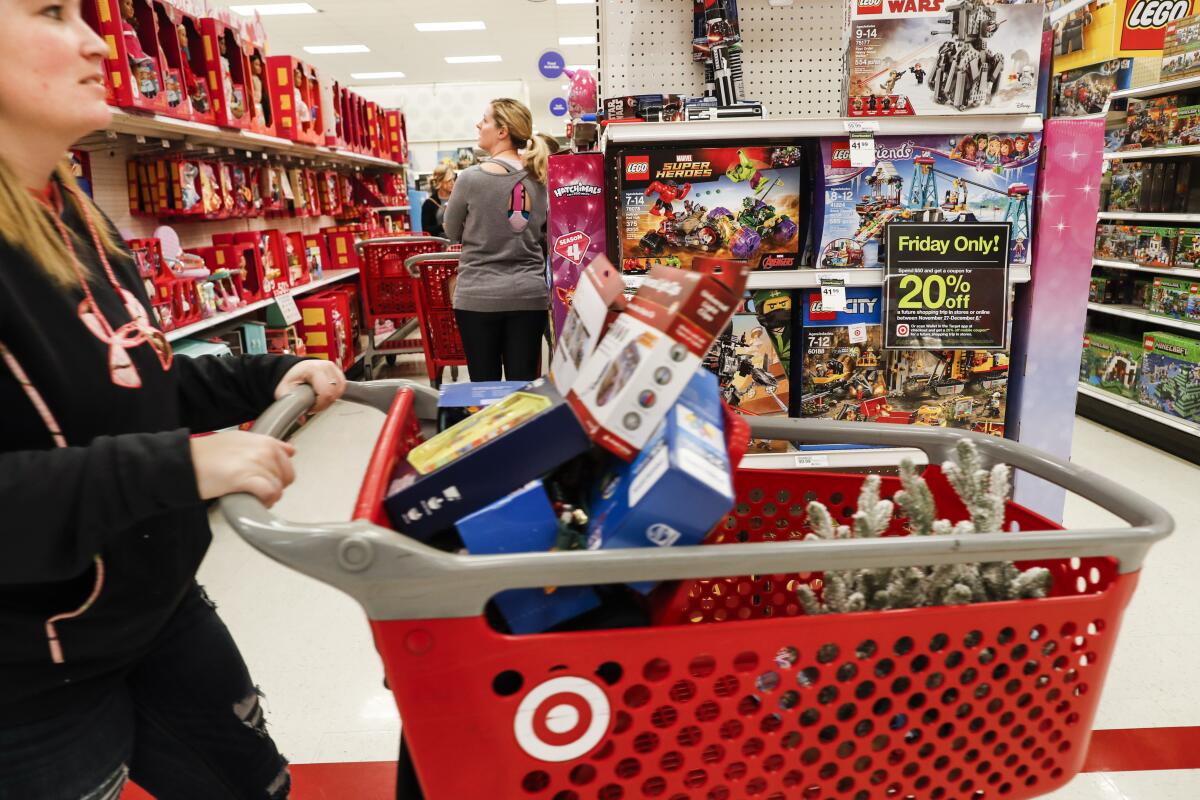Target did not have a merry Christmas, but the economy still looks strong

- Share via
Target Corp. reported a rare shortfall in holiday sales Wednesday, raising concerns about the challenges ahead for the traditional retail industry even as the economy remains strong.
Target’s disappointing growth of 1.4% for November and December, dragged down by toys and electronics, fell well below the same months of the prior year. It joined a growing list of retailers reporting meager performances during the crucial holiday shopping season.
Target cut its expectations for same-store sales growth for the entire quarter. Its stock fell 6.6%.
The major retailer’s weak numbers cast a pall over the entire sector, with investors leery of any hints that consumers, who are a major driver of the U.S. economy, are getting nervous.
However, analysts say the U.S. consumer remains financially strong, and some blamed increasing competition from not only Amazon.com Inc. but also a slew of online competitors, such as mattress maker Casper Sleep Inc. and home goods purveyor Wayfair Inc. Many believe that these rivals are starting to create material challenges for traditional retailers.
“We are seeing a healthy consumer that is choosing different ways to spend the same amount of money,” said Joel Bines, managing director at consulting firm AlixPartners. “The consumer today is presented with an array of options for virtually every product you can think of, from footwear to apparel to toys and games to electronics.”
Bines added that many of these online retailers are held to different standards for profitability than traditional large companies.
Ken Perkins, president of research firm Retail Metrics, agrees.
“Consumers can sign up for all these subscription services, from pies to clothing,” he said. “That’s definitely siphoning off sales from traditional retailers.”
Target experienced weaker-than-expected sales of electronics, toys and home goods. Comparable-sales growth of 1.4% in the November-December period contrasted with a very strong 5.7% increase in the same period a year earlier. Target’s toy sales were flat, while consumer electronics business fell more than 6%. Home goods sales were down more than 1%.
Jim Silver, editor in chief of toy review site TTPM.com, believes based on his talks with toy manufacturers that Amazon picked up market share in toys this past holiday season. He also said the demise of Toys R Us in 2018 has cut down on impulse buying in that category.
“Impulse buying doesn’t happen online and can add up to significant volume,” Silver said.
Target’s digital sales rose 19%, also down from last year’s jump of 29%.
The Minneapolis company said it now foresees fourth-quarter comparable-sales growth in line with the 1.4% increase it experienced during the holiday period. It had previously forecast a rise of 3% to 4%.
Target and other discounters such as Walmart Inc. have been among the strongest performers in retail even as Amazon continues to make inroads. They have reconfigured product lineups and improved delivery services, with some success.
Other department stores, namely those in malls, have not had the same success. J.C. Penney Co., Kohl’s Corp. and Victoria’s Secret parent L Brands Inc. all reported holiday sales declines. Macy’s Inc. reported a small decline in holiday sales, though it was not as bad as investors had expected.
The National Retail Federation, the nation’s largest retail trade group, forecasts that holiday sales rose between 3.8% and 4.2% for November and December. The holiday sales forecast marks an increase from the disappointing 2.1% growth for the same period in 2018. It’s also above the average holiday sales growth of 3.7% over the previous five years. The group is expected to release final holiday results Thursday after the federal government posts December retail sales data.
Retailers post fiscal fourth-quarter results next month, and that will provide more insight into the mood of U.S. consumers through January.
Neil Saunders, managing director of research firm GlobalData Retail, said Target’s holiday performance wasn’t dire, because it would have been tough for the chain to top its strong year-earlier results. He also believes that the disappointing electronics and home sales were affected by the timing of Black Friday, which was later than usual.
“Overall, Target remains a good retailer on the right trajectory,” Saunders wrote. “It may have stumbled and slowed over the holidays, but it is still one of the most attractive runners in the retail race.”
That was largely the sentiment among industry analysts.
Seth Sigman of Credit Suisse agreed, saying that “there are many bright spots within that would point to this being more of a blip rather than the start of a new trend.”
More to Read
Inside the business of entertainment
The Wide Shot brings you news, analysis and insights on everything from streaming wars to production — and what it all means for the future.
You may occasionally receive promotional content from the Los Angeles Times.










